|
American Supra: Book Five
Turning Back To See
Let your boat of life be
light, packed with only what you need- a homely home and
simple pleasures, one or two friends, worth of name, someone
to love and someone to love you, a cat, a dog…,enough to eat
and enough to wear, and a little more than enough to drink:
for thirst is a dangerous thing.
Jerome Klapka Jerome,
1859-1927, from Three Men in a Boat (1889)
‘Tis distance lends
enchantment to the view,
And robes the mountain in
its azure hue.
Thomas Campbell,
1777-1844, from Pleasures of Hope
A Woman is a foreign
land,
Of which, though there he
settle young,
A man will ne’er quite
understand
The customs, politics,
and tongue.
Coventry Patmore,
1823-1896, from Woman
Life is an end in itself,
and the only question as to whether it is worth living is
whether you have enough of it. Oliver Wendell Holmes,
Jr., 1841-1935, from John Marshall (1901)
What is life? A madness.
What is life? An illusion, a shadow, a story. And the
greatest good is little enough: for all life is a dream, and
dreams themselves are only dreams…. But whether it be dream
or truth, to do well is what matters. If it be truth, for
truth’s sake. If not, then to gain friends for the time when
we awaken.
Pedro Calderon De La
Barca, 1600-1681, from Life is a Dream
Father, dear father, come
home with me now,
The clock in the belfry
strikes one;
You said you were coming
right home from the shop
As soon as your day’s
work was done.
Henry Clay Work,
1832-1884, from Come Home, Father (1864)
A man travels the world
over in search of what he needs and returns home to find it.
George Moore, 1852-1933,
from The Brook Kerith (1916)

Tbilisi 8
The covers keep us warm. We snuggle close to use our body
heat to ward off the cold. Certainly the walls and the
windows do not. The walls hold the night’s cold and the
windows are fragile interference for the harsh winter winds
that drop the temperature each night, each morning, each
day. I go to the Academy when I teach and it is cold. I go
to the National State Museum to view the works of art by a
sliver of daylight from the covered windows and it is
freezing inside so that we do not stay long. This morning,
although the bathroom calls, we stay a little longer under
the covers. There has been no gas for a week, therefore no
heat and no cooking. As we summon our resolve to meet the
day and the practical matter of using the bathroom becomes
more pressing, we move, get up quickly to dress in the
multiple layers of cloths that are only a partial deterrent
to the cold. The lights go out as if throwing another
challenge to living in Georgia before us. We also have had
infrequent electricity since we came back to Tbilisi in late
January. Anne jokes, “Maybe we should go back to bed.” For a
moment, we consider this wild idea and then reject it with
pleasant thoughts. We turn to the job at hand, battling the
cold. When the temperature is low in the apartment, the
freezing attacks the body but more it attacks the spirit. It
is hard to have lofty thoughts when your limbs are beginning
to numb It is just too damn cold. We have endured it for two
months; Georgians have endured it each winter for eleven
years. In May, we will be leaving all our winter clothes
with friends who are staying. Many cannot afford to fly away
from the cold that blows from the Caucasus. America and
Russia has a “cold war” for years but they had no idea of
this kind of indoor weather. Yesterday, Parliament (who does
noting to help with the problem, in fact these five days
were caused because the government did not pay a Russian gas
company) announced that it was “Women’s day” and all the
shops were filled with flowers. It was beautiful, although a
rebirth of a day that the Communists started. I suspect,
though, that it really was some camouflage for their
inaction in holding off the cold. Raphael, our driver, tells
us about how the television says, “Today it will go on.” For
the fourth and fifth day, it is a lie. There is no gas.
There is no electricity. There was no water all night. My
room for painting, which had been the warmest with the gas
heater, is cold and unused. It is hard to celebrate the
colors of life when your fingers are blue and chilled to the
bone. And the Georgia wind does its job to find each crack,
each defense against the numbing frozen march of air. It
blows the useless television disc outside the living room
window, the roofs of tin on the garages below containing all
the BMWs and Mercedes, and it blows away initiative if you
let it. Therefore, I write to warm my limbs. I write and
draw to keep alive the creative spirit which is the heat of
my life. I write because passion can be warmed by the inner
body heat. And lastly, I write while I seriously considering
going back to the warmth of our bed.
A Georgian painter friend complained the other day about her
daughter’s minor operation, which was in actuality not so
minor. Her daughter has lived in America for a time and has
gone to doctors there. Any procedure was explained in detail
before any “minor surgery” was performed. Here, she says,
she is told nothing by the doctor in charge. That was the
style during Communist times but it was to change when
democracy came to power. Obviously, it has not. The friend’s
daughter is very upset because she feels that it is more
than just doctors not telling patients what they are doing.
It is a human rights issue. I think that she might be right.
We have no gas for days and no one, in any way, television
or by public announcement, tells the people “why”! Oh, they
play the domino excuses. “It is not our fault. It is the
Russians. It is the City of Tbilisi. It is someone else than
us.” Raphael relates to us what he gets from the television
but mostly it is propaganda and inaccurate (everyday is the
day that it will come on). They promise and do not deliver.
No explanations.
The electricity came on at 10:00 a.m. after three hours,
while businesses downstairs have to use more expensive
kerosene, but now we have our electric heater on. I notice
the pattern of the outages. It is always during business
hours so that the stores have to use their generators run by
kerosene. I ask, “Who sells the kerosene?” Another Georgian
friend answers, “Mafia.” Whether it is true or not, there is
no trust in the government, its announcement or its
promises. Now, we huddle in the small computer room which
can take the chill out of the air. The rest of the apartment
is still freezing. In Georgia, you count your small
blessings and wait.
As the end of my Fulbright Scholar’s nine months comes to an
end, I begin to compare the two cultures, Georgia and
America. The major differences, beyond size and living
style, are three that I see: 1) the system (only one, and
not really that, of the cornerstones of democracy are in
place in Georgia- education of the elite to lead), 2) human
rights (women, citizens, minorities, etc. are not honored in
practice although they are in rhetoric), and 3) America’s
problems with the elemental comforts of life are the
exception; in Georgia, they are the role. The latter
situation leads to no planning, no scheduling, no
initiative. There are no or little human rights honored in
practice which leads to distrust of any governmental agency
or individual who wishes to make politics his or her
profession. The first difference that I mention, the system,
is a major problem to becoming a full partner in freedom and
peace. I have come to love Georgia and her people. In a
family setting, they are a most generous people. They take
you to the womb of their heart. Although this is a male
dominated culture, I still see it as a “she” not a “he”
culture. In truth, the women may be one of the dominant
forces in bringing Georgia into the 21st century
and to a true free democracy. The Georgian love of art
(visual, performing and literary) is an asset to growth but
it must be wedded to a political system which can be
trusted; one which gives more than it takes.
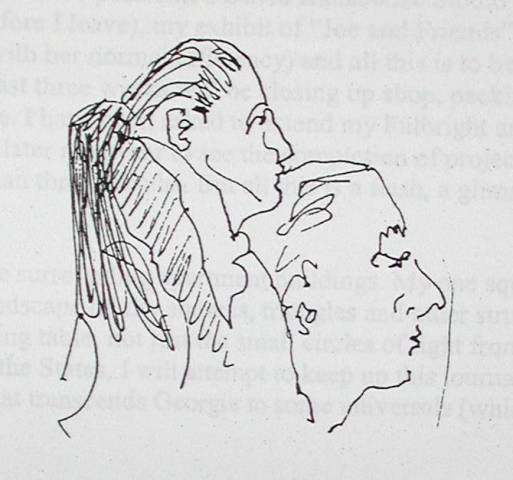
Tbilisi 9:
I have a new story about David Kakabadze. He hated Socialist
Realism but was force to do it to survive under the Soviet
iron control. He also wanted his Cubist adaptations of
Socialist Realism to be seen by the public, therefore he
painted a landscape filled with cones, cubes and cylinders
and in front of them, at the edge of the mountain, he placed
three billboards with images of Lenin, Stalin and Beria (the
latter two from Georgia). The museum was forced to hang his
Cubist work with other works from that time. Who could
reject Lenin, Stalin and Beria? When Stalin and Beria were
out of favor with the new Soviet leader who came to visit,
the museum was then forced to paint black over their
portraits, but it still left Lenin in front of the grand
landscape. It pleases me to see the ingenuity of this artist
who fought to the last to get out his ideas.
Something happened yesterday and I still do not know what. I
stopped feeling that “I have too much to do in too short a
time”. It just stopped and I cannot explain why. I made some
decisions three days ago about priorities, writing them out
in a formal order but that does not explain the joy, the
buoyancy of my attitude. I am a renewed person, suddenly not
tired, no old, not overworked, and I have not stopped my
jobs, got ride of any commitments or slackened my pace on my
painting. I have completed two large paintings, and spent a
day at home in the apartment simply with Anne, gone to a
simple but enjoyable dinner for two of chicken, been, fried
potatoes and a piece of cake, snuggled early into bed, and
got up as usual early in the morning to write and think.
Nothing has changed and yet it is a new world, a new
beginning. I still cannot explain it and will not try. It
just feels good to believe that “I have all the time that I
need to do what I wish to do.” As my daughter, Samantha,
says, “Dad, you are weird.”
I have not honored my lone lighted friend before so here he
is. I think of gender with this candle because of the limp
lean of his stature. It was more pronounce when I first used
him for light but each night as his wax softens I made the
attempt to straighten him but there is always some lean. He
must be an old candle light, like me, which will never again
be perfectly straight but still gives off as much light as
the newly-bought, young candles newly-formed and dipped. We
bought this one in Kutaisi and as Anne says, “We may need to
buy some more before we leave in late May.” It is a few
dwindling days, but who is counting?
The stillness is broken by the lone dog calling to some
unknown, unseen mate who yelps replies in irregular patterns
of sound- at least, irregular to my untrained ear. In my
last days here, I will work with the State Conservatory on a
plan for major improvements. As the Rector, Manana, says:
“Our situation is terrible and the building is a national
treasure.” Since Anne and I have had nine months of pure joy
at the Opera House listening and watching the graduates of
the Conservatory, this is the least that I can do to repay
their efforts and excellence. Also, by going to the
Conservatory each week, maybe my ear will be trained to same
degree that my eye has acquired. Sound is the one thing that
they have in abundance. Now, though, outside, the rain has a
pattern that I cannot read with any context.
It has been raining steadily since early evening last night
and now it is just a sound in the night to go with the other
creaks, groans, and splashes. The day is waking- the
building stirs. Cars are now heard in the distance. The wind
picks up so the metronome of irregular beats comes again
into the silence. A dog backs and fades. I need to give my
lighted friend a rest, clean up the oilcloth that covers my
desk, and snuggle again against the security and warmth of
Anne.
Days are for others and projects but the night is my time. I
wake again early and sit in the darkness listening and
thinking. Now, the barking is from a pack of dogs. It
punctuates the physicalness of the silence and momentary
hiss of a passing car. Anne found a second candle. It is the
same size as my lone friend, and now I sit in the living
room, again at the oilcloth covered table, reading and
writing. What surprises me still, even after 45 years of
marriage, is that I am still filled with the love that first
drew us together, but now it is richer and deeper, adding
years to the mix and knowing that what we share will last in
our children. But we will burn out like my two candle
friends. With the power outages, I read more and write more,
not being able to work at the computer. It is part of the
process of survival. I cannot dwell on the aches and pains
of growing old. You ignore what you can and endure what you
cannot. There is little time for thinking about the vehicle
needing repairs since life is precious and time for thinking
must be things that uplift the spirit, not push it into
thinking “old”. At some point, the body will affect the mind
but I will fight this “wearing out” process to the end. As I
said to a friend, “Do not go gentle into that good night.
Rage, rage, against the dying of the light.” I do ramble on
but that is part of the Georgian experience.
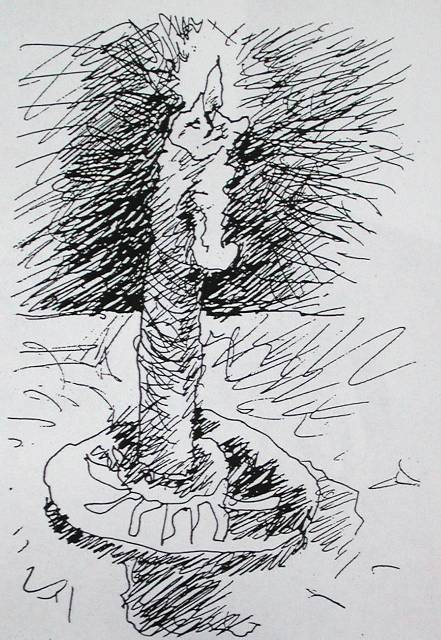

20/20 Vision:
The year is 2020. Karaman Kutateladze walks the land again
where his vision started so many years ago but it has
changed so dramatically in the last 18 years that even he is
surprised at what Garigula’s Art Villa has become. It seems
only yesterday that the Foundation of the Revival and
Development of the Cultural Heritage of Shida Kartli was
created in 2000. Now, it is the idea and training center for
artists in the Caucasus Region, located in Shida Kartli but
moving out to the edges of the world. He had talked of this
vision with his wife Ana and other social activists in the
late 1990s. He had known the villa as a boy when his father,
who founded the Tbilisi Art Academy, had spent summers in
Gargula. It was always that “lovely 19th century
house in the vineyards with the tower, called the Bolgarsky
Citadel”. It was not until the year 2000 that the vision
started to materialize when the Georgian Ministry of Culture
awarded the Foundation, a group of visionaries, headed by
him and supported by two architects, Dima Mamatsashvili and
Irachi Vacheishvili, the house and the grounds for an Art
Villa.
As he looks around, the white blossoms were coming out and
the green/brown vineyards still give abundant grapes for
wine. This is a region known for its wine and its healthy
climate. Pilgrimages by Georgians to Garikula have been
going on for years because of the medicinal quality of the
spring water. In fact, myth states that the sunlight in
Garikula and the air can stop nose bleeds and help
intestinal problems. Garikula is a mix of myth and magic.
The magic comes from the townspeople and the artist
population. Garikuka (although 75 kilometers from Georgia’s
capitol, Tbilisi) has a history as a retreat for the artists
and artisans of the Caucasus. The original mission of the
Foundation was to decentralize culture in Georgia. Little
did they imagine that it would reach out at this time to the
corners of the world?
But now walking down the road which leads to the splendid,
renovated Art Villa, its tower still standing majestically
tall with the two wings of the house restored to their
former beauty like arms open to greet all visitors, Karaman
remembers the shape that it had been in when the vision
began. The walls, floors, balconies, ceilings, wine cellar,
ice house, and everything needed a face life and more, a
reconstruction. Students and artists came to help,
architects donated time, some painting and mural making was
done, but more was needed. Now, that work is completed. New,
young students, some on scholarship (supported by the
Foundation’s endowment), from academies all over the
Caucasus region (and around the world) know of the Art
Villa, its invited masters of modern art and its
international faculty of painters, craftsmen, sculptors,
designers, film makers and other media specialists. On each
side of the road that winds around the Bolgarsky Citadel is
the workplaces of the artists and artisans. It is like
stepping back into history and forward to the future at the
same time. Garikula, in the past, was a year-round retreat
for artists but now it brings tourists to the small hotel.
They walk the streets and enjoy performances in the 200 seat
theater.
Down by the river is the water-power plant which had been in
the plan from the beginning, giving electricity to each shop
and the Citadel (while saving money to operate the Art
Villa), but that is not all. To the right stand three
windmills where only one was planned in 2002 and on each
house are solar panels which use the abundance of sunlight
in the valley. Most of the food for the Art Villa is still
grown on the 25 thousand square meters of land. Anyone who
has tasted Georgian food knows that it’s fame. Karaman says
hello to the potter from Japan, the printmaker from America,
the Germany painter and of course all the Georgian artists
and craftsmen who have come back to Georgia to be part of
the Garikula Art Villa success story.
Tonight there will be another grand opening of art works
from the summer students and faculty. Because of the weather
in the summer months with cool, refreshing breezes off the
Tezami River and the circle of rounded mountains protecting
this special place, the town is filled with international
tourists. New businesses are appearing each day. Karo, as
his friends call him, cannot keep up with the growth in the
small town or the Shida Kartli region.
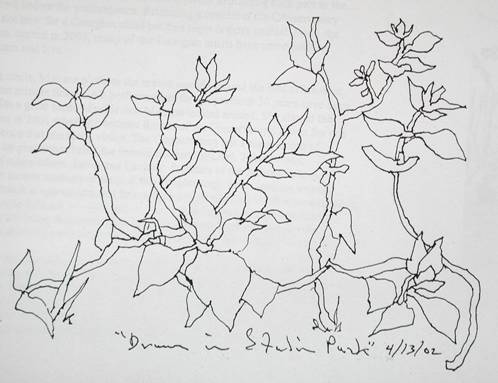
With a broad smile, he thinks about how his father wanted an
Academy in Tbilisi to train artists in the early 20th
century, and now this vision of the Art Villa, realized in
Garikula, will train artists for the 21st century
and beyond. Standing at the entrance to the artist’s street
which had been a dim dream in 2002, he thinks: “Socrates was
correct. ‘Education is the fuel of the mind’ and art is the
flame that sets that mind and spirit ablaze.” The Garikula
Art Villa is alive and ablaze with creativity on this late
summer afternoon, one of many in the history of a vision.

Vision: 2021.
Imagine. The year is 2021. Exactly 120 years from the time
when the Conservatory building was built, 103 years since
the Tbilisi State Conservatory was registered as the first
music school in the Caucasus, 30 years since Georgia won its
fight to become a democracy, and 20 years since the great
renovation project of 2001 was conceived. The grand old,
repaired structure is showing off its glory for this special
night. Professor Manana Doidjashvili, winner of many
international piano competitions, retired Rector of the
Conservatory, and tonight grandmother, is attending another
world- renowned artist’s concert but this time with her
granddaughter and this time the artist is Georgian,
returning home. As she looks around with pleasure in seeing
the Concert Hall dressed in her best neo-classical clothes,
she thinks: “Every one hundred and twenty year old needs
some time in the repair shop to keep fit and young looking,
with a tinge of age to add distinction”. The little girl
comments on the new gold on the decorations, sparkling with
tiny beams of light from the magnificent chandelier placed
there in the renovation of 1997. As they enter the great
Concert Hall, opened in 1943, the girl’s eyes became wide as
she snuggled into her soft, blue seat. Like all Georgian
children, this is a known ritual which begins at the age of
two or three. In the beginning ten years when Georgian
democracy was growing up, the little girl’s mother had
attended with Manana each week for the opera, chamber,
individual and folk music concerts. At the Opera House, down
the street, she had watched and listened to adult ballet,
symphony, and opera, plus children’s performances at Sunday
noon, with a storyteller explaining each part to the
overflowing crowd before the performance. Attending a
concert at the Conservatory Concert Hall is not new for a
Georgian child but this night is extra special. Since the
Great Renovation started in 2001, many of the Georgian
artists have come back to Georgia to perform and live.
With a knowing smile, Manana pictures the crowd outside
around the box office door, hoping to buy last minute
tickets. All performances for the previous 30 years have
been sold out. It is with a great sense of pride that Manana
looked around. She started the Great Renovation in 2001 when
she became Rector of the Conservatory. It was for this
family of excellence that she had a vision. The Conservatory
has a track record of excellence with its professors being
the former students of Liszt, Tchaikovsky, Venieavsky, and
many others. Lavin and Lavinia, founders of the Julliard
School of Music, sent their former students to teach at the
Conservatory. Now, looking around, Manana thinks that it is
appropriate that this unique school of music is often
mentioned in the same sentence as Julliard, ---------, and
--------- when the great world centers of musical learning
are being discussed. Now in 2021, students from everywhere
are attending classes at the Conservatory. “It is like a
musical United Nations,” she thinks.
Before the major improvements to the Concert Hall in 1997,
she remembered walls falling apart and rats running the
halls instead of the crowds that now congregate around the
entrance door. Before the great renovation project began in
2001-2002, equipment had worn out, walls were peeling and
cracked, the foundation of the building was in standing
water, and no room had sound-proofing on the doors. Now it
is well lighted, safe, repaired when needed, and continues
to have a successful, energized family of musicians (that
is, beginning students and seasoned professionals). “Yes”,
she thinks, “It has always been a family of excellence but
now it not just a Georgian secret. Now, the entire world
knows that George Balanchine (Balanchidaze) and others was
Georgian. Now everyone speaks of the Tbilisi State
Conservatory in the same breath as any great, world music
center deserves. And now in 2021, all the George Balanchines
have come home to teach and perform.”
A young man walks on stage after a triumphal tour in
thirteen nations and sits at the newly-purchased Steinway
piano. The audience’s sound hushes to a knowledgeable
silence. A breath is taken. A vision of the music passes
through everyone’s mind. The hands slowly raise, and then
strongly strike a note that fills the hall with renewed
glory, and another chapter in excellence opens at
Saradaishvili Tbilisi State Conservatory.
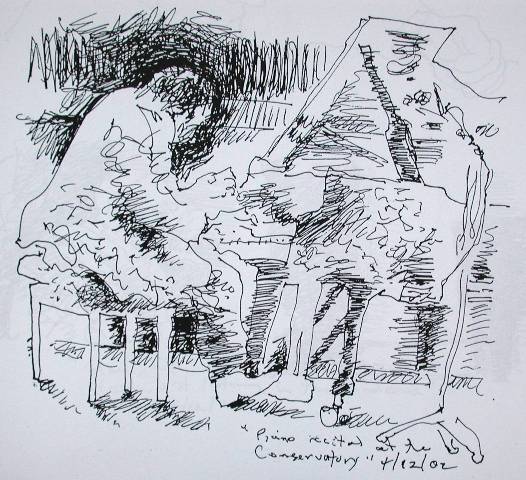

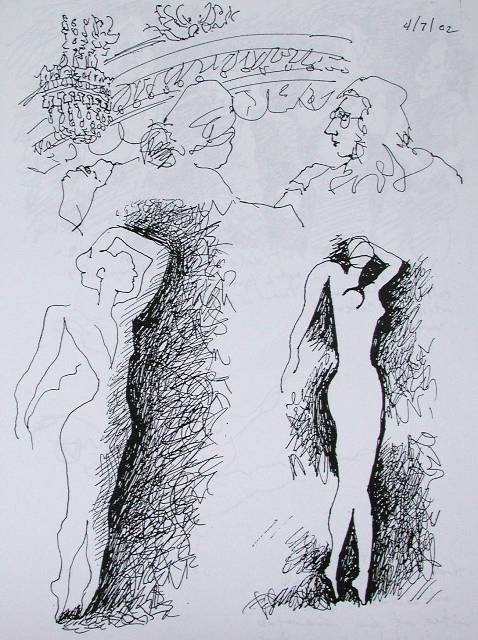
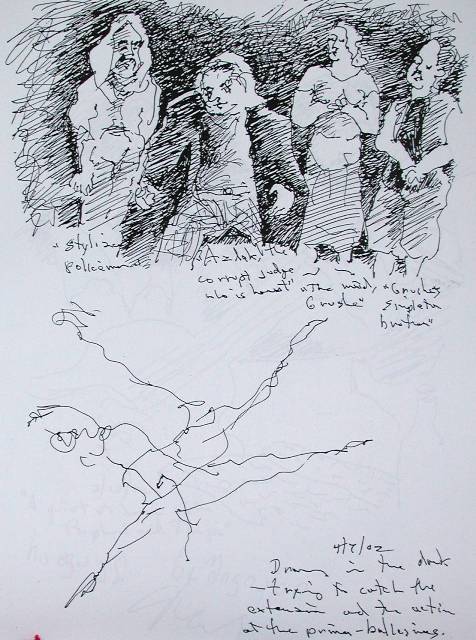
Tbilisi 10
A lone dog barks. It is a welcomed sound unlike the vicious
sound of late last night. That was obviously a short but
violent dogfight. It woke both of us until the silence was
restored. When we arose and began to go out the front
entrance of the apartment house, a large dead dog lay across
the opening. We went to shop out the back entrance. On
returning, Anne noticed a smaller dog with her head on the
body of the dead one. It moved Anne deeply. For me, it was
symbolic of life here- on the edge of survival. It was only
later in the day when we went out for shopping again that we
observed that the body had been adjusted several times so
tenants could pass. We never went that way all day and when
we returned from the Embassy, the dead carcass was gone.
Later when we walked to pick up fresh, hot bread, we looked
into the large containers for garbage but the dead body was
not there. And now, except for the lone dog barking in the
early dark of morning, the image is fading. Survival demands
thoughts of living, not lingering on the dead.
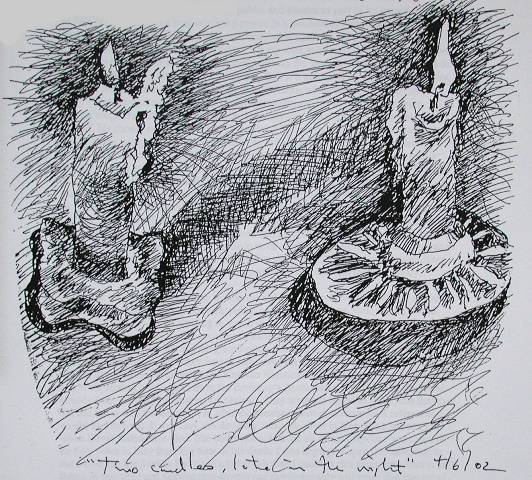
It is another day of magnificent ballet and farce. The one
image that remains is the one line of a dancer’s trained
body- one gesture where a figure stands on tiptoes and seems
to fly. Isn’t that what all artists do- help us to stand on
our tiptoes and imagine flying in grace and eternal beauty?
It is one line against the chaos of an image of lines. It is
one trained line of beauty that stands against the darkness.
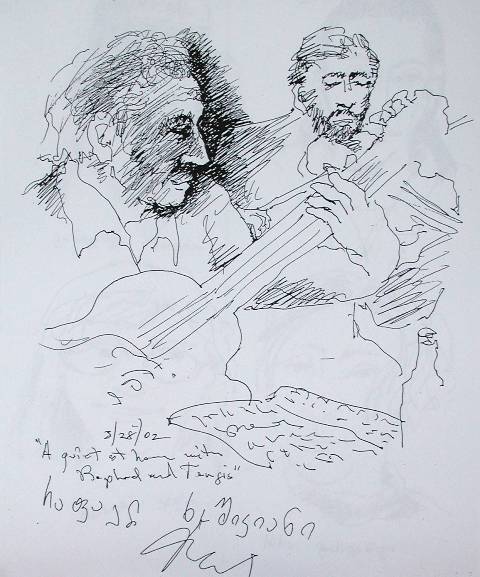
This morning another candle burned to extinction and a much,
much taller one was placed on top of its still hot wax. The
tall one is about fourteen inches in height, standing beside
the last of the Kutaisi candles that is now down to its last
few inches of service.
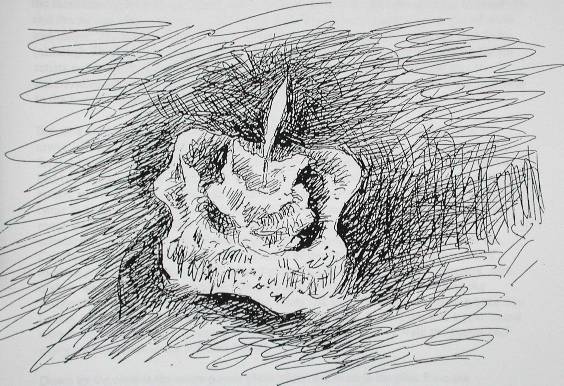
As always, we went to a concert at the Conservatory where we
did not know who was playing or what the program contained.
Much, much later we learned that the piano concert was by
Jan Claude Petie from France. He played Shubert, DeBussey,
Ravel and Debrie. During the first two numbers, I noticed a
man intently listening to every note with his eyes closed. I
singled him out of the audience to draw. It was only at the
first intermission that I learned the reason for this
special listening. He tuned the piano. His ear, unlike mine,
heard the soft and hard edges to all the shades of sound,
plus the nuances in between. A woman in a red sweater nudged
by my seat and left a thin red thread on the back of the
green seat before me. I was torn between reestablishing the
purity of the field of green and leaving the thread as an
accent to heighten the green. Why is it that I see all the
little things that others might miss? It has been my life to
see the small reds on a field of green.
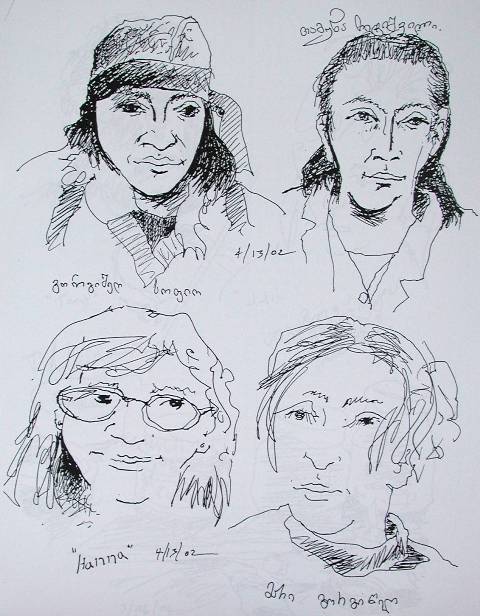
The sound trickles over us like rivulets of water or crashes
upon the shores of our inner souls. One piano, one player,
one audience and it is all one. The waves of sound rise up
and bring us tenderly back to the earth of our emotions.
Just as the eye can stir our emotions so the notes in the
grand concert hall play upon our heartbeats and nervous
system. For a time, we are the music. All through the
performance, I observe a weathered face of a woman who lives
each note, leaning forward, her arm upon the seat in front
and her intensity taking her someplace else.

I learned a new superlative today. The word is “vishi”. I
believe that it is Russian for “beyond superb”. It is a word
to use with the appropriate hand movements and positioning.
It is said with a low, guttural sound and extended into time
and space.
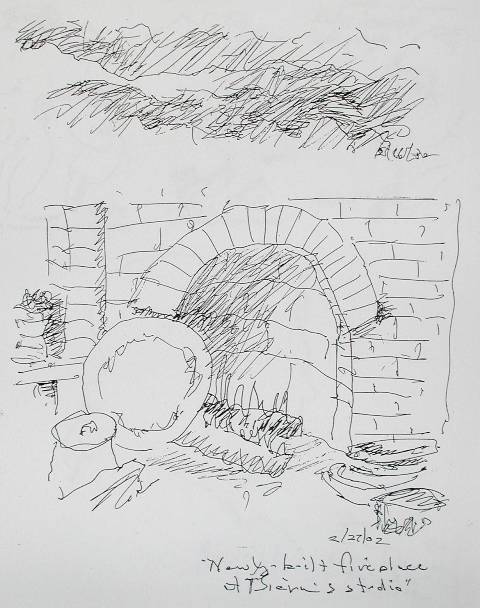

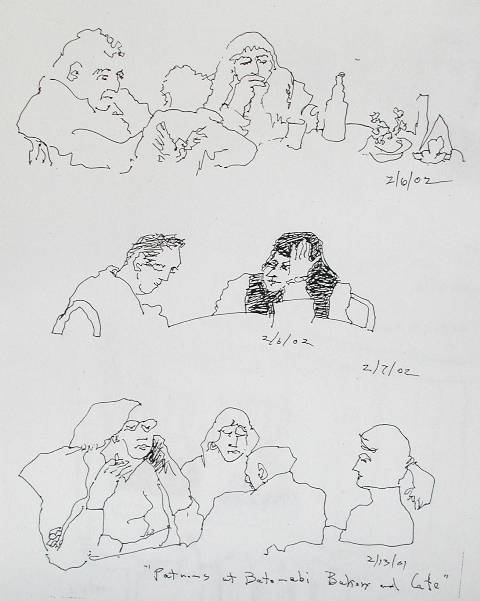
In a few days, this adventure as a Fulbright Scholar in
Georgia will be over and we will fly to Beijing, stay a few
days, and then back to Texas- home. I am sure that many of
my friends will expect me to be the man that I was before I
left, returning to the routine of the Southwest (and I may
to a degree). What they will not see, or really understand
because I do not understand it completely, is that I am not
the same man who came to Georgia last summer, journeying to
Kutaisi to be part of an international artist’s symposium,
returning to Tbilisi to teach, paint, write and lecture on
American art and architecture, and help a few individuals
and institutions to learn the survival game of free
enterprise. Somewhere, just under the newly-sewn, gift vest
with Georgian designs is a younger man, dressed as my
now-Georgian, imaginary ancestor. He looks something like
this:

There is silence that goes beyond normal where even the
creaking of this old concrete building is a welcomed sound.
I know that it is impossible for concrete to “creak” but
there is that sound that dismisses the impossibility of the
event. A gentle wind adjusts the tin roofs but only a quiet
sound in the absence of any other sounds. Somewhere in the
kitcheon, something keeps a metronome kind of measured beat
but not a disturbing sound, a kind of soothing remembrance
of our timed existence. There is no electricity again so I
write by the light of two candles. At one time in my life,
this would have seemed romantic but now it is just
inconvenient. Anne stays in the warming comfort of the bed
but I was getting too warm and the solace of sleep is not
possible when the mind is alive with ideas. Now, I am not
warm at all. One light, probably run by battery power, is
lit high up in the darkness, like a square star in the
approaching morning sky. It is interesting with candles that
as they burn they give off more light, using more wicks to
burn. The morning sky now is a dull dark gray with a whisper
of blue. Silhouettes of the apartment buildings come to life
and a tower of red dots projects itself into the dawning
sky. The wind picks up and the metronome becomes more of a
hurrying beat. My mind says, “It is an antenna somewhere
hitting the building, blown by the wind” but this logic does
not register, only the bar sound striking the impenetrable
apartment building.
Saturday, I had class again, two students and two faculty
members. The Academy does nothing to advertise my lectures,
and no one comes to open the room that I was using in the
first semester. Anne gets discouraged. I do not have the
time or luxury of that emotion, having too much to do in too
little time left before we leave Georgia. I will, though,
create a poster to get out the word on my Saturday lectures
and see if that will help.
Now the single square of light is spotlighted against a
large minimal square of black/gray. There is a painting
there somewhere, I think, storing the image.
It is now only 67 days before we board the airplane to
Beijing and then home. I find it hard to look ahead more
than a week at a time and those weeks are streaking by with
a speed that surprises me. The Kagle Resource Room for the
American Art and Architecture (a name that I first protested
but not loudly or prolonged), the playground (which Lika has
taken over with a passion), a David Kakabadze Studio
Foundation (which must be created before I leave), my
exhibit of “Joe and Friends” (which is taken over by Nino
Zaalishvili with her normal efficiency) and all this is to
be accomplished in the next five weeks. The last three weeks
will be closing up shop, packing and getting ready for the
journey home. I have been asked to extend my Fulbright and I
decided that, if asked, I will come back later next year to
see the completion of projects that do not get completed,
but no more than three months. But all this is a flash, a
glimmer of a future decision, reality is NOW.
Definition is coming to the surrounding apartment buildings.
My one square of light slips back into the emerging
landscape of city squares, triangles and other structures. I
am beginning to see my painting table, not just the small
circles of light from the two candles. When I return to the
States, I will attempt to keep up this journal but here it
has been a lifeline to reality that transcends Georgia to
some universals (which also transcend America). I see
Georgia as a surreal landscape at times. Time here is like
the Dali painting of dripping watches. In Tbilisi, citizens
do all that they can to survive and push away the reality of
their bare existence, no pay for hard work, and constant
unintelligible shortages of basic needs like electricity,
water and gas. Tbilisi motorists drive too fast, have no
road etiquette (except push in front, go first), nudge
bumpers into line without waiting for their turn, seeming to
rush everywhere but have nowhere to go except survival.
Magritte painted this world of faceless people in a
measured, ordered, stagnant,
perpetually-in-motion-with-no-destination world. And yet, at
home with their families or at the Opera House with their
children, one sees a different face to Georgia, generous,
purposeful and beauty-seeking. In business life, all too
often, planning is a myth. Many feel that Americans have
silver and gold pockets for the asking, deep and unending.
The concept that I have tried to teach of “to get, you have
to give something of value” is difficult for Georgians to
fathom and “in kind” contributions matching hard cash for
grants is a painful lesson, not easily learned. It appears
that no one values their time, because the time that people
work is not valued in salary amounts commensurate with their
labor, energy or effort. Therefore to put a value on life
and work to match someone else’s grant money is not apparent
to a Georgian. As I said many times, life here is hard.
We are driven to the Opera House to see the ballet, give our
tickets and are told that they are for last week’s
performance (although when we bought them, we were told that
last week’s ballet was sold out but they had tickets for
this week’s special event). Standing in front of the small
caged window, I complain that I was given the wrong tickets.
A student of mine from the Academy helps to translate and we
are told to go to the person in charge upstairs, inside the
Opera House. When we get there, we are ushered to our box
seats as if nothing had happened. It seems that when tickets
are printed they run out, so any ticket is given to
Americans to use. Somehow, magically, all at once, the
tickets are for this week. Georgia is not like anyplace in
the world that I have traveled. You do have to accept
surrealism everyday as a way of life. It seems to work.
As I stood at the ticket counter, a large woman tried to
edge her way in front of me, although she could see that I
was being waited upon. Since I am also large, she didn’t get
in front of me but I had to bodily make it clear that this
would not happen. There is no concept of “waiting your
turn”. There is no turn. For me, it shows a lack of
understanding of human, individual rights. Life here is a
collective pushing in front of the line. Again, the contrast
is vast. The ballet is marvelous. I have used that word
“marvelous” too often but I have tried to find another word
and just “marvelous” fits. The ballet dancers are
professional, acrobatic and superb. The audience is one of
the best that any society can boast for in their
understanding, appreciation and loyalty. The box where we
are seated has an older prima ballerina sitting in front of
us. It is refreshing to watch her on center stage at each
intermission. Going to the ballet today has been the worse
and the best experience.
June:
Letter from Tbilisi: As our year in Georgia comes to
an end and my Fulbright work is over, images spring to life
before my mind’s eye in a clear and sometimes fuzzy
panorama. Georgia is like the Roman god Janus, the keeper of
doors and gates, who was honored as the god of beginnings
(in fact, we name our first month of the year after him).
His Roman name was “Ianuarmius” which is close to our word
January. He was honored because “one must emerge through a
gate or door before entering a new place.” Certainly,
Georgia is a new place which has traditions which stretch
back 3500 years. Janus was the god with two faces.
Walking the streets in Tbilisi, one sees enormous poverty.
Beggars everywhere with a hand out, mothers with rag doll
babies in their limp arms, haggard old people, talented
musicians, and little children who follow you down the
street tugging at your clothes. If you try to cross
Rustevili Avenue, you take your life in your hands. You
daily see the most inconsiderate drivers in the world speed
up when a pedestrian is in sight. I watched a man on a small
side street getting knocked down by a Mercedes (or it might
have been a BMW) and saw the driver yell at the man for
injuring his shiny car. It seems that drivers take the years
of frustration of no electricity, no gas, no water for long
periods at unscheduled times out on the gas pedal. There is
no road etiquette. Double center lines are ignored, one way
streets are just a challenge to overcome by backing up or
driving in the wrong direction, and red lights are
occasionally obeyed. Everyone drives as if their life
depended on the speed that they could obtain on the short
stretches of narrow streets whereas the truth is the
pedestrian’s life is the one at stake.
And yet in the home, as a guest, you are honored as no guest
is honored anywhere in the world. As one friend said in
Kutaisi, “Georgia has survived the oppression of Mongols,
Turks, Persian, and Communists because at our table we honor
all guests, even our enemies. We greet them with wine, food
and an honored place at the table. In fact, at the Georgian
table, a plate is always left empty for the guest who might
come.” My students carried my bags to class. They came to
lectures when the inside of the building was freezing more
than the outside because the three-foot thick walls retained
the night’s cold and held it for the day. I told them, “If
you come, I will teach and we will freeze together.”
Georgian hospitality is legendary and goes back for
thousands of years. It is one of the tools of their survival
as a people, a culture and a unique civilization. But then,
since democracy and freedom came in 1991, their institutions
are impersonal. The hospitality of the home is not carried
over yet to the public places. It took me three days to find
their national state museum and when I entered no one
greeted me. And museum viewing is an experience unlike any
other place. It is dimly lit, cracked and peeling walls, and
at times viewing national gold and silver icons by candle or
flashlight (it happened three times in West Georgia). My
friend Maka Dvalishvili worked several years to create a
collection of museum reproductions of rare Georgian
treasures. She raised the money from outside sources,
designed the objects, began the marketing campaign and then,
a few days before the final official opening, she was told
the national museum, who housed her institution of arts and
culture, would have no electricity so the opening had to be
cancelled. The government would not pay the electric bill
for the museum. It was with tears of joy that she heard that
she could open the exhibition, but with only three days to
get out invitations and prepare. Planning in Georgia is a
daily process and long range plans are a myth or dream of
the future.
Like the image of Janus, Georgia shows many sides. Its love
of the arts is unmatched. I have watched mothers take small
children to the ballet, opera and exhibitions that would
challenge the patience of mature, knowledgeable adults. They
learn dance, music, singing, painting, poetry early in their
education and hold it close for life. The supra, the ancient
toasting to honor and preserve the traditions of Georgia, is
an event at every meal where family and guests gather. Some
drink too much; most doesn’t. The stories of recent courage
and dignity by individual Georgians are too numerous to
relate. Everyone tells you the government is corrupt and new
leadership is needed but the march on Parliament in November
of 2001 was peaceful and orderly. Although the problems are
enormous, the process of becoming a new democracy is moving
forward in fits and spurts but still moving. In Roman times,
the temple of Janus was a symbol of the state of the Empire.
If the gates were closed, the Roman Empire was at peace; if
open, it was in turmoil or war. The gates in Georgia are now
both open for democracy to come in as an honored guest and
closed so that the Georgian traditions can still flower and
grow.
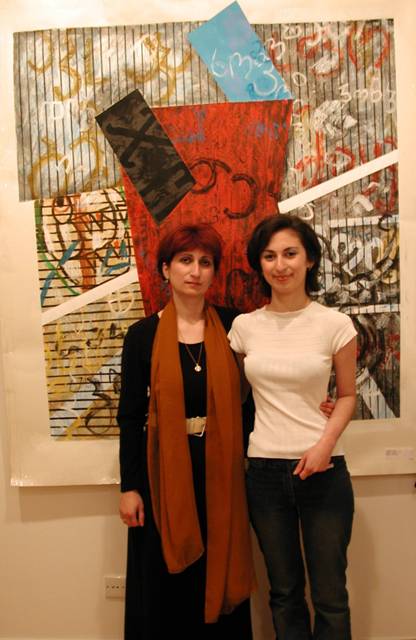
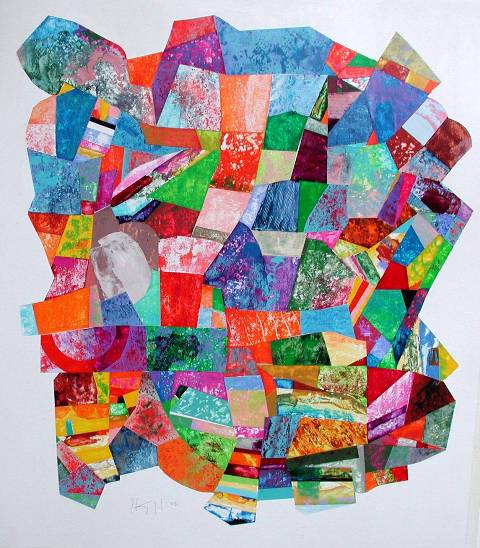

|

